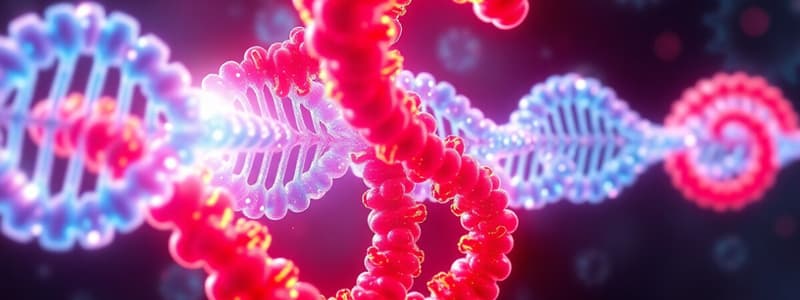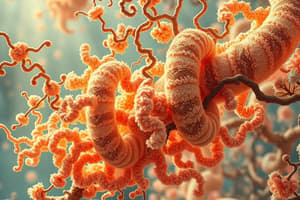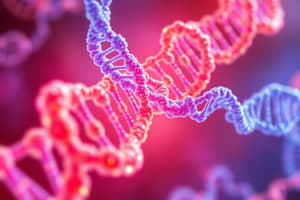Podcast
Questions and Answers
What allows body cells with the same DNA to perform different functions?
What allows body cells with the same DNA to perform different functions?
- Gene regulation and differentiation (correct)
- Cellular mutation
- Random DNA rearrangement
- Increased cell size
Which of the following processes is known for not regulating genes in eukaryotes?
Which of the following processes is known for not regulating genes in eukaryotes?
- Transcription
- RNA splicing
- Reverse transcription (correct)
- Translation
Which component is NOT part of the lac operon structure?
Which component is NOT part of the lac operon structure?
- Operator
- Promoter
- Genes with related functions
- Enhancer (correct)
What is the main function of transcription factors in gene regulation?
What is the main function of transcription factors in gene regulation?
What is the focus of therapeutic cloning?
What is the focus of therapeutic cloning?
Which type of stem cells can differentiate into any cell type?
Which type of stem cells can differentiate into any cell type?
What type of gene is known to lead to cancer when mutated?
What type of gene is known to lead to cancer when mutated?
Which statement is true regarding embryonic stem cells and adult stem cells?
Which statement is true regarding embryonic stem cells and adult stem cells?
What is the main purpose of bacterial plasmids in genetic engineering?
What is the main purpose of bacterial plasmids in genetic engineering?
Which technology is used for editing genes in living organisms?
Which technology is used for editing genes in living organisms?
How do restriction enzymes function in genetic engineering?
How do restriction enzymes function in genetic engineering?
What is the role of primers in the Polymerase Chain Reaction (PCR)?
What is the role of primers in the Polymerase Chain Reaction (PCR)?
What does the process of gel electrophoresis accomplish?
What does the process of gel electrophoresis accomplish?
What are Restriction Fragment Length Polymorphisms (RFLPs)?
What are Restriction Fragment Length Polymorphisms (RFLPs)?
Which factor represents a significant challenge when using genetic engineering in crops?
Which factor represents a significant challenge when using genetic engineering in crops?
What is the first transgenic dog created by inserting a gene from?
What is the first transgenic dog created by inserting a gene from?
Flashcards are hidden until you start studying
Study Notes
Lecture 11 - Gene Regulation and Cloning
- Body Cells: All cells in an organism have the same DNA, but they express different genes to perform different functions.
- Gene Regulation: Gene expression is controlled by various mechanisms including turning genes "on" or "off" through regulatory molecules.
- Gene Regulation Mechanisms:
- Transcriptional factors: Bind to enhancers and promoters to activate gene expression.
- MicroRNAs: Deagrade or block translation of specific mRNA transcripts
- Homeotic genes: Master control genes regulating developmental pathways during embryogenesis.
- Cloning: The process of creating genetically identical copies of cells, organisms, or DNA.
- Reproductive cloning: Replacing an egg's DNA with a nucleus from a somatic cell.
- Therapeutic cloning: Used for generating embryonic stem cells for medical treatment.
- Oncogenes: Normal genes that when mutated can lead to cancerous growth.
- Carcinogens: Substances increasing cancer risk by causing mutations in DNA.
- Stem Cells:
- Embryonic stem cells: Can differentiate into any type of cell, derived from embryos, and raise ethical concerns.
- Adult stem cells: Limited differentiation potential, derived from adults, and less controversial.
Lecture 12 - Recombinant DNA Technology and Genetic Engineering
- Recombinant DNA technology: Combining genes from different sources.
- Genetically modified organisms:
- Bt Corn: Modified to produce a toxin that kills pests.
- Genetically modified foods: Widely used in the US since 1996.
- Restriction enzymes: Cut DNA at specific nucleotide sequences, producing "sticky ends".
- CRISPR-Cas9 system: Powerful gene editing technique.
- Genetically modified organisms:
- DNA fingerprinting: Using differences in DNA fragment sizes to identify individuals.
- Restriction Fragment Length Polymorphisms (RFLPs): Variations in DNA fragment sizes produced by restriction enzymes.
- Gel electrophoresis: Separating DNA fragments by size and charge.
- Polymerase Chain Reaction (PCR): Amplifies DNA sequences using primers.
- Short Tandem Repeat Analysis (STR): Analyzes 13 STR markers to identify individuals.
- Applications of Recombinant DNA Technology:
- Developing vaccines: Inserting genes into viruses or bacteria for safer and more effective vaccines.
- Creating Genetically modified crops: Enhanced disease resistance, pest control, and nutrient content.
- Therapeutic applications: Gene therapy, developing synthetic hormones, and treating genetic diseases.
- Challenges of Genetic Engineering:
- Ethical considerations: Public concerns about food safety, environmental risks, and genetic modification.
- Regulatory issues: Strict regulations for evaluating and approving genetically modified organisms.
Studying That Suits You
Use AI to generate personalized quizzes and flashcards to suit your learning preferences.




